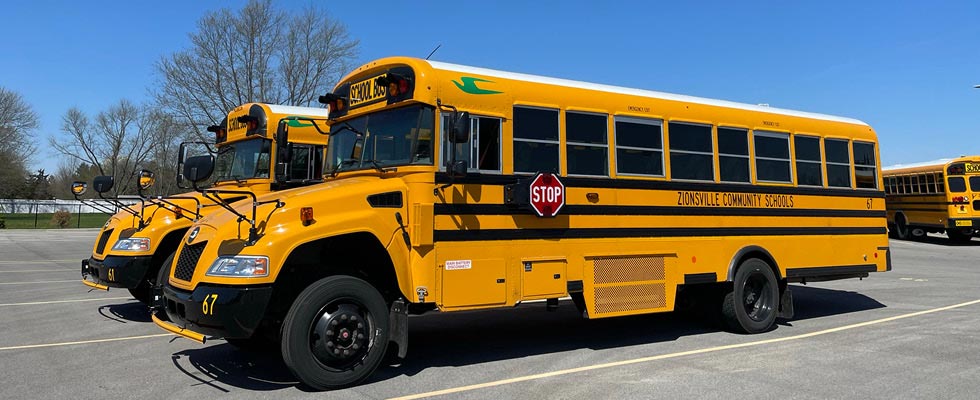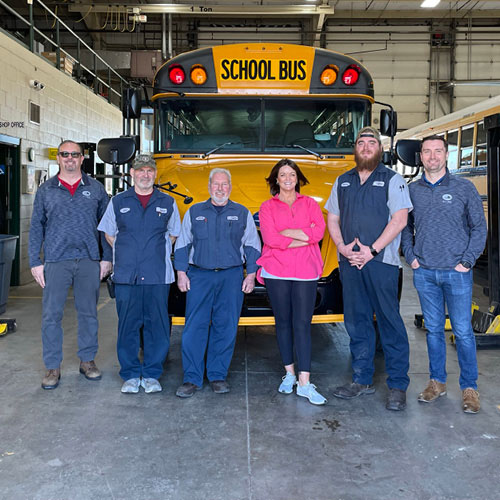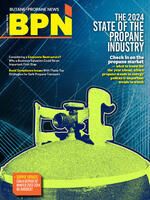
Just northwest of Indianapolis lies the town of Zionsville, Indiana. It’s here that Zionsville Community Schools is enabling an increasingly robust school bus system for its growing student population. Fifty-four of those buses are now fueled by propane autogas, showcasing the district’s commitment to an alternative fuel that supports a healthy environmental future.
“We love operating propane buses,” said Amy Eaton, transportation manager at Zionsville Community Schools, in a press release on the district’s propane-fueled buses. “They produce less pollution, which is great for our students. They’re much quieter, which benefits the drivers. And they provide fuel savings, which is great for the school.”

Zionsville Community Schools’ usage of propane school buses started back in 2020 with an initial adoption of 21 buses. Following the success of the propane school buses, the district recently added 33 additional buses to its transportation services, bringing the total to 54 propane-powered vehicles. These buses now encompass 65% of the district’s fleet and cover 73% of its routes.
In addition to the growing number of propane school buses, Zionsville Community Schools has also partnered with Co-Alliance to install propane fueling stations on-site for the fleet. The fuel cost savings on the switch from diesel to propane have saved the district money in its budgeting for a growing student population.
Ahead, hear more from Eaton on the importance of having on-site fueling stations for its propane school bus fleet, as well as Mike Hayden, propane manager at Co-Alliance in Avon, Indiana, on how the company works with the district to meet its fueling needs.
Amy Eaton
Why did you select an on-site propane fueling station, as opposed to other options?
Our long-term goal is to have the majority of our buses using propane. Makes sense that we have the ability to fuel on our lot.
How is the station configured so it doesn’t clog up traffic? Is there one lane? Do buses fuel one by one?
We have two propane stations at our facility in two different lots. One fuels one-sided and the other has the ability to fuel on both sides. The entrance to our main lot allows for buses to pass while fueling. There are times that buses back up, but only because of the time it takes to fuel.
How long does it take to fuel one propane bus?
When they fuel at half, it takes about 10 minutes. If they fuel on empty, it will take 15 or so minutes.
How often is your propane tank refilled by Co-Alliance?
Weekly.
Do you use your propane dispenser to manage your buses’ fueling?
We track all of our fueling through the fuel management system.
What was your experience like working with a propane supplier?
Co-Alliance is very easy to work with. Mike Hayden is my contact, and he is always very helpful.
Mike Hayden
How did the relationship with Zionsville start?
This relationship, like most, started with a local connection. Our salesperson was on a local board with the school’s chief financial officer. This opened the door for discussion on the environmental benefits, quieter operation and lower total cost of ownership that propane autogas can provide.
How did you counsel Zionsville for their needs, i.e., the tank size, the dispenser, the building of the station, etc.?
We met with the school and reviewed their immediate and long-term plans. This gave us direction for the scope of the project, allowing us to then look at the facility to meet the district’s needs while considering setback standards, codes and traffic flow.
Did you negotiate long-term propane pricing for the district?
We recommend our customers lock in a price for their winter needs to avoid the normal seasonal run-up in price brought on by high demand and cold weather, and our school districts are no different. With tight budgets at most school districts, fixed price contracts not only avoid a seasonal price increase, but also allow for better budgeting of fuel costs.
What size tank does Zionsville have and how often do you fuel it?
Initially, we installed a 1,990-gallon tank for Zionsville Community Schools with a dual hose fuel dispenser. As they grew their propane autogas fleet, they created a second parking area where we have recently installed a second 1,990-gallon fuel dispenser. Because of the unique layout, the second location has a single hose dispenser. We deliver once a week.
Could you expand that station to meet the district’s future needs?
Every school district that we have worked with that runs propane autogas buses and has purchased new buses has added additional propane autogas buses. Every single district. This speaks volumes to the fact that propane autogas is a great solution for local school districts. This is the case because every step in the process works well together. I can talk for days about propane autogas and what a great fit is has proven to be for many local school districts!


